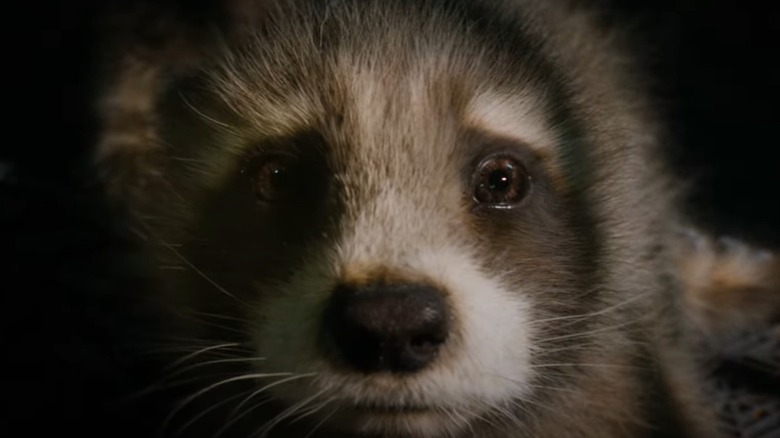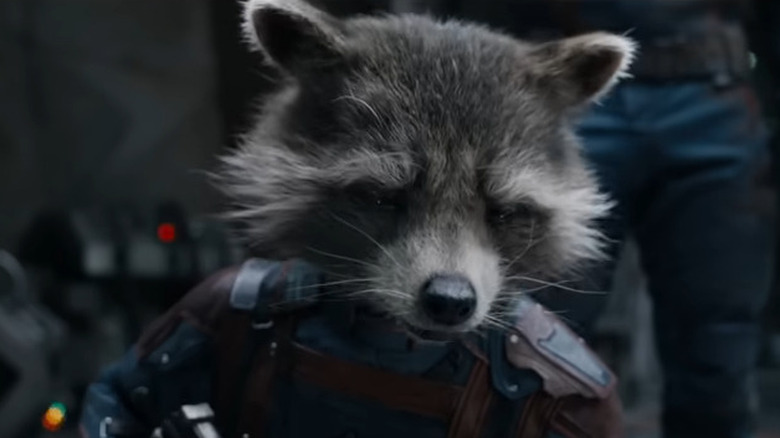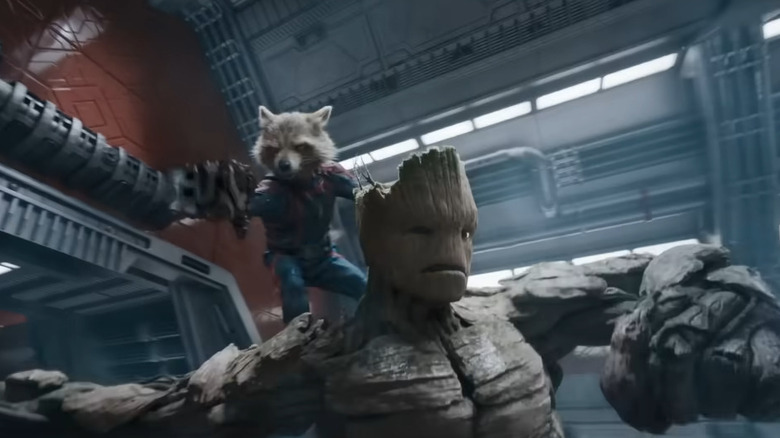Forget Star-Lord: Rocket Is The Real Lead, And Heart, Of Guardians Of The Galaxy Vol. 3
Spoilers follow.
James Gunn's new film "Guardians of the Galaxy Vol. 3" tells two stories. In the A-plot, Peter Quill, aka Star-Lord (Chris Pratt), has turned to drinking after losing his true love Gamora (Zoe Saldaña). Thanks to some time-travel rigmarole, Gamora has returned, but from a point in the past where she had never met Star-Lord, making it extra painful to see her. Star-Lord and the rest of the Guardians of the Galaxy will have to set off on a grand quest to find the very specific medical technology needed to save their beloved friend, Rocket (voice of Bradley Cooper) who has been grievously injured in an attack by the indestructible Adam Warlock (Will Poulter)
While his friends trek around the galaxy infiltrating high-tech medical facilities, the comatose Rocket dreams of his origins. In flashbacks, we see that Rocket, alongside any number of other test animals, was medically and genetically altered by a eugenics-happy supervillain called the High Evolutionary (Chukwudi Iwuji). While the High Evolutionary seems initially friendly to the innocent young Rocket, the villain's evil is evident from the start. Rocket and his three animals friends — otter Lylla (Linda Cardellini), walrus Teefs (Asim Chaudhry), and rabbit Floor (Mikaela Hoover) — are outfitted with grotesque machinery and kept in a filthy, rusty cage in a back hallway. Their situation is dark and desperate, but the four animals manage to stay upbeat and cheerful as they dream of escape and seeing the sky for the first time.
Rather tragically, the animals' dreams will not be realized, and their fate left Rocket alone and marked by trauma. Rocket's backstory will eventually play into the A-plot, but, more importantly, it will provide "Vol. 3" with its emotional core. Indeed, "Vol. 3" refocuses the "Guardians" series as a whole directly on Rocket.
Rocket science
When Rocket was introduced to cinema audiences in Gunn's first "Guardians of the Galaxy" in 2014, he was more or less a comic relief character. A sassy talking raccoon that fires guns and hangs around with a tree man named Groot? How quirky and hilarious. He also possessed a twisted sense of humor, finding it utterly hilarious when he stole someone's prosthetic leg or glass eye. It seems that if Gunn had not been working under the four-quadrant-pleasing, PG-13-rated imprimatur of Disney, he likely would have stuffed Rocket's mouth with hundreds of F-bombs.
As the "Guardians" movies elapsed, however, they have become more intensely sentimental, and the quirkiness has given way to a particular flavor of intense warmth. The Guardians themselves are all wounded outsiders, and the films have elected to zero in on their loneliness and pain before letting them fall into the arms of an unusual but functional found family. The humor in Gunn's "Guardians" movies has the flippant ring of latter-day, self-aware post-irony (the milieu of writers like Kevin Williamson and Joss Whedon), but the reason why the series has so many fans is its wounded heart. The characters all go on extraordinary adventures and murder hundreds with their ray guns, but at the end of the day, find themselves opening up and holding one another in ways they didn't expect.
With "Guardians of the Galaxy, Vol. 3," audiences now learn that Rocket may the be team's ur-member. He suffered torture at the hands of an animal tester, and the film is replete with images of animals in pain; viewers sensitive to on-screen animal harm should be amply warned. He survives by being mean and violent, but one can see the cuddly animal inside.
He is, after all, a cuddly animal.
The lead character
One might find that abusive father figures make for a common theme of the "Guardians" films.
In the first two "Guardians of the Galaxy" movies, the story focused mostly on Star-Lord. He, too, suffered his own trauma. Kidnapped from Earth by space aliens at age eight, the very same night he witnessed his mother succumb to cancer, Star-Lord was taken into the care of burly pirates. Star-Lord eventually learned that his biological father was actually a narcissistic, planet-sized, psychic super-alien called Ego (Kurt Russell), who was way worse than the abusive-but-affectionate pirate (Michael Rooker) who raised him.
Both Gamora and the vicious android Nebula (Karen Gillan) were raised by a genocidal soldier, Thanos (Josh Brolin), who taught them the value of violence and who tortured them relentlessly. They too are marked by trauma, and spend the movies reconnecting as sisters and contending with the fact that their father was a monster.
With "Vol. 3," Rocket's own father figure can be added to the list of Marvel's Bad Dads. Also, Rocket, whose backstory is explained most deeply, begins to emerge as the bravest survivor of the lot. His abuse resulted in his intelligence, and his bitter ambivalence reads in every scene. By the end of the film, Rocket has stepped into a leadership role, allowing Star-Lord to take care of himself back on Earth. Rocket may have been brusque, but his resolve, intelligence, technical know-how, and impatience have always been better leadership qualities than Star-Lord ever possessed.
Rocket is the protagonist of "Vol. 3," and his continued survival and resolve provide the movie with an inspiring thematic message. Who needs that pesky human dude anyway?


